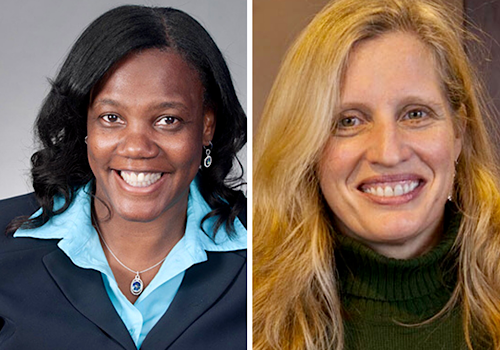New Network Will Address Global Health Care Inequities
Two researchers from the University of Maryland, Baltimore (UMB) have been awarded a three-year, $950,000 grant by the Robert Wood Johnson Foundation (RWJF) to create the Global Learning for Health Equity Network.

Yolanda Ogbolu, left, and Virginia Rowthorn
The network will examine ways to learn from other countries to address health care inequities — a process called “global learning.” The United States continues to lag behind high-resource countries on significant health indicators, including infant mortality, chronic disease, and overall mortality, largely due to health and health care inequities. Interventions designed to eliminate health equity in other countries may also work in local communities in the United States. The grant award comes at a time when the COVID-19 epidemic has illuminated grave racial and social inequities in the U.S., especially in under-resourced communities.
UMB was selected to serve as the organizational home to the Global Learning for Health Equity Network based on the University’s long-standing commitment to health equity, community-engaged research, global health, and global learning. Yolanda Ogbolu, PhD ’11, MS ’05, BSN ’04, CRNP-Neonatal, FNAP, FAAN, associate professor and chair of the Department of Partnerships, Professional Education, and Practice at the University of Maryland School of Nursing, and Virginia Rowthorn, JD, LLM, associate professor, University of Maryland Graduate School, and assistant vice president for global engagement, UMB, are co-principal investigators on the grant.
The Global Learning for Health Equity Network will build connections among researchers and global health practitioners who are seeking opportunities to advance global learning and strengthen community capacity to bring global ideas to U.S. communities.
Ogbolu and Rowthorn will conduct the project in several phases. In the first phase, they will conduct a scoping review to categorize and synthesize existing literature on global learning for health equity and the many heterogeneous threads that comprise this new field of inquiry. They will then work with five learning communities (including Baltimore) where global learning projects for health equity are underway to capture characteristics about where the project was originated and about the U.S. project site, focusing especially on community engagement elements of the implementation process. Moving beyond these five learning sites — which have representatives on the grant team (see below) — Ogbolu and Rowthorn will gather data about other global learning projects underway in the U.S. and use the compiled data to create a framework to facilitate global learning for health equity in the future.
Ogbolu, who was a previous RWJF global learning grantee for her research studying disadvantaged communities in West Baltimore to understand the impact of social isolation on health, served as a member of a RWJF expert panel on global learning, along with other team members, to design an approach to expand the state of the science for the emerging field of global learning. Her current project, the “Belong to Baltimore” study, is a global learning project that leverages Brazilian expertise in a Baltimore program designed to build social inclusion and expand access to social resources for caregivers of young children.
Rowthorn has conducted national workshops and written a number of scholarly articles on global learning and reverse innovation. These efforts have put UMB at the forefront of how to bring the best ideas for health equity, public health, and community engagement to the United States. This paradigm reverses centuries-old academic, cultural, and governmental norms that supported a one-way flow of knowledge out of the country, limiting the country’s arsenal of evidence-based strategies to overcome health challenges.
Jay A. Perman, MD, chancellor of the University System of Maryland and former president of UMB, has long been an advocate of global learning and global health. In his letter of support for the grant, he stated, “For more than 40 years, as UMB developed a prominent global health program, the University’s researchers worked under the premise that addressing the world’s most pressing health challenges requires the effort of researchers, practitioners, and community members all over the world and the translation of good ideas from one setting to another — across professions and across national borders.”
Bruce E. Jarrell, MD, FACS, president of UMB, is delighted that UMB will be home to the new network. “The proposed network firmly aligns with UMB’s strategic plan, which encourages initiatives that deepen and expand local and global engagement by providing health, legal, and social work programs, and engaging in research to promote social justice and improve health,” Jarrell said. “A network to understand, facilitate, and evaluate global learning is a critical next step to ensure that evidence-based interventions to promote health equity from around the world are accessible to communities in the U.S.”
Ogbolu and Rowthorn will collaborate on the grant with national leaders from four diverse global learning communities:
- Sonya Shin, MD, Navajo Nation, Four Corners region of Southwest United States
- Ruth Dudding, BS, CHES, Athens (Ohio) City-County Health Department
- Alex Plum, MPH, CHES, Henry Ford Health System, Detroit
- Kevin Fiori, MD, MPH, MSc, FAAP, Albert Einstein College of Medicine/Montefiore Health System, Bronx, N.Y.
Three consultants with deep expertise in global learning, health equity, and community engagement also will support the grant work:
- Ami Shah, BA, MPH, senior community liaison representative, Los Angeles County Department of Public Health
- Adam Taylor, MPA, past executive director, Global to Local, Seattle
- Stephen Thomas, PhD, director, Center for Health Equity, University of Maryland, College Park
- Keshia Pollack Porter, PhD, professor, associate dean for faculty, and director, Health Policy Research Scholars, Johns Hopkins University



